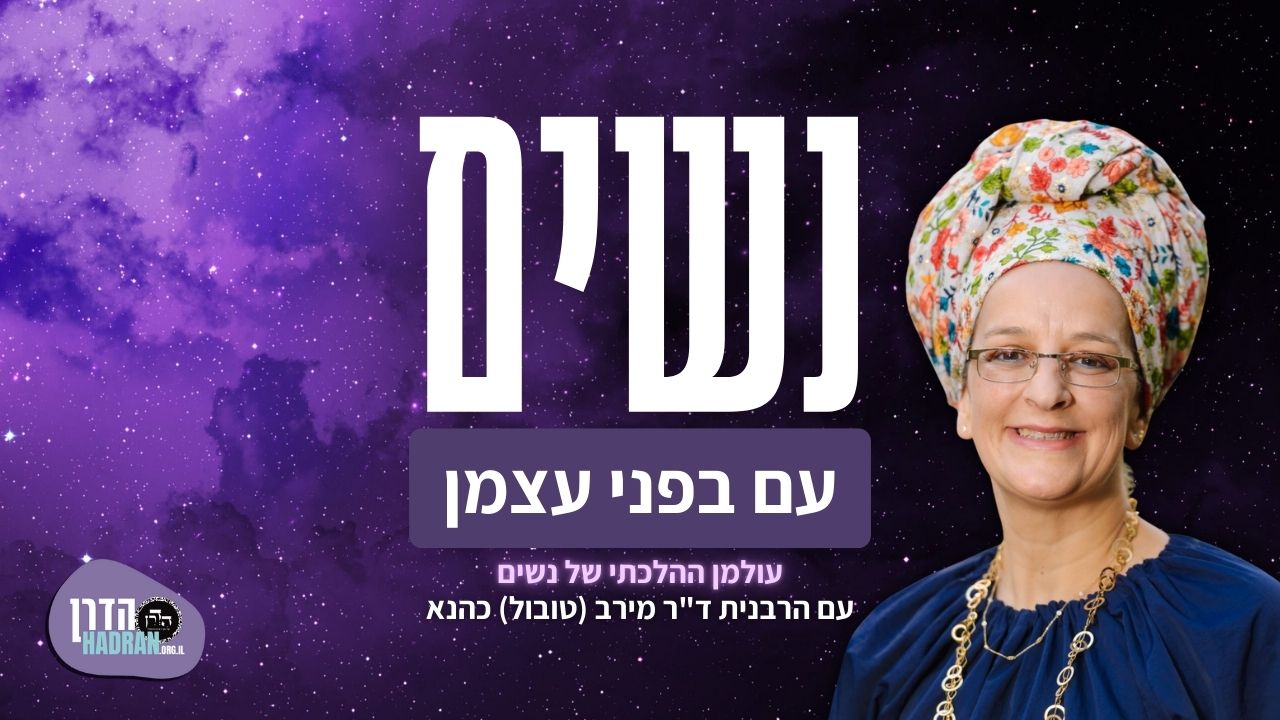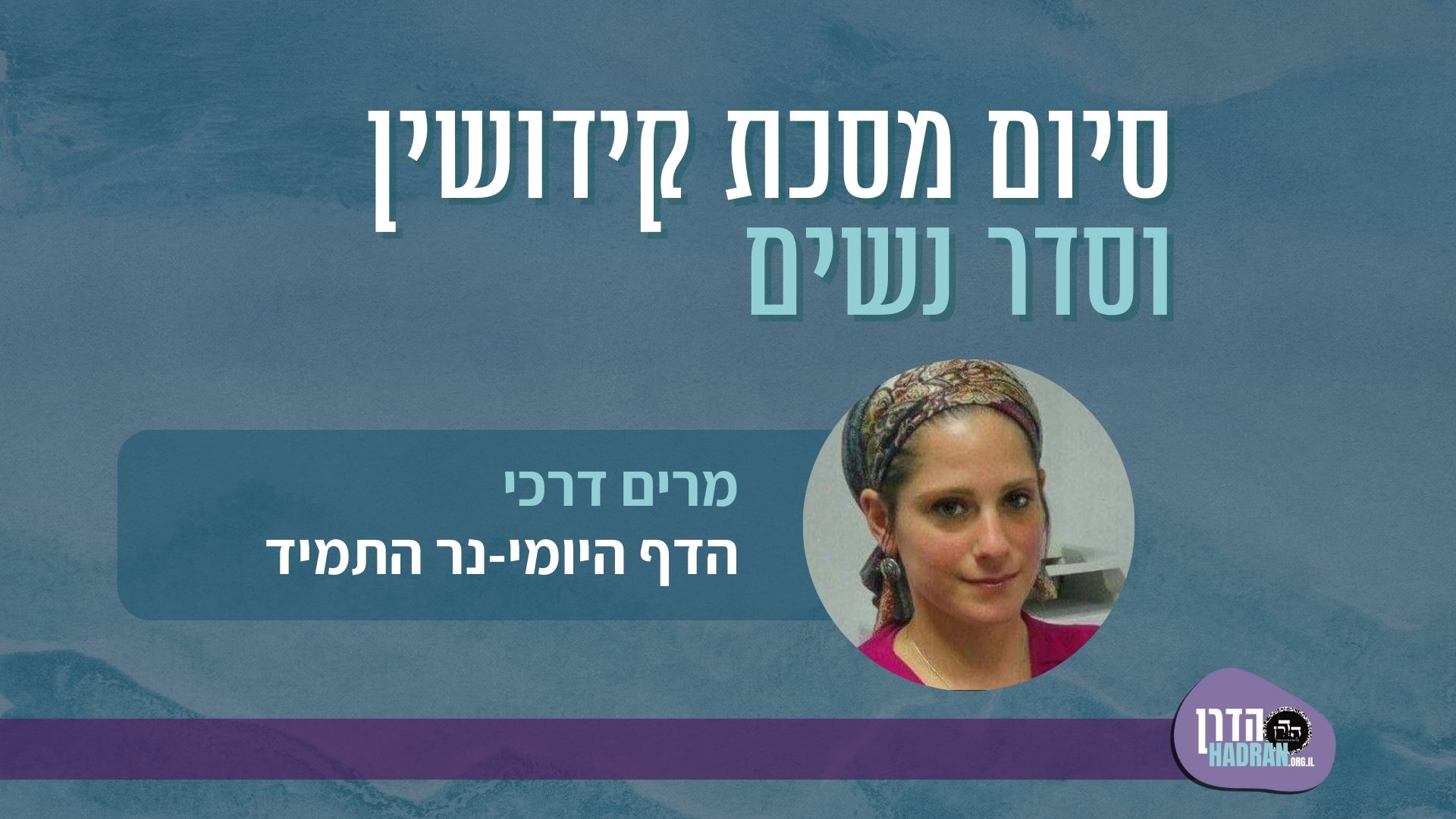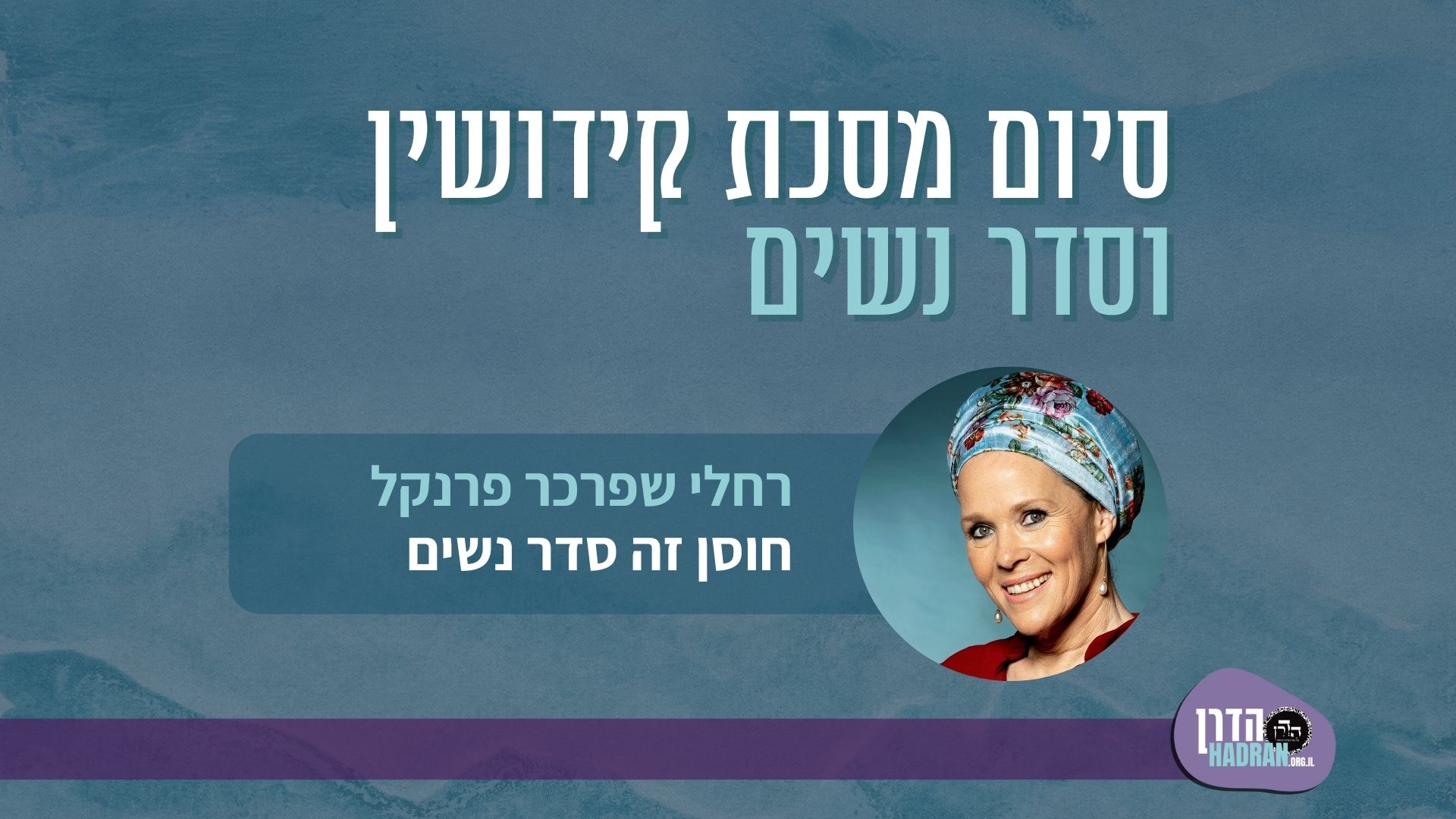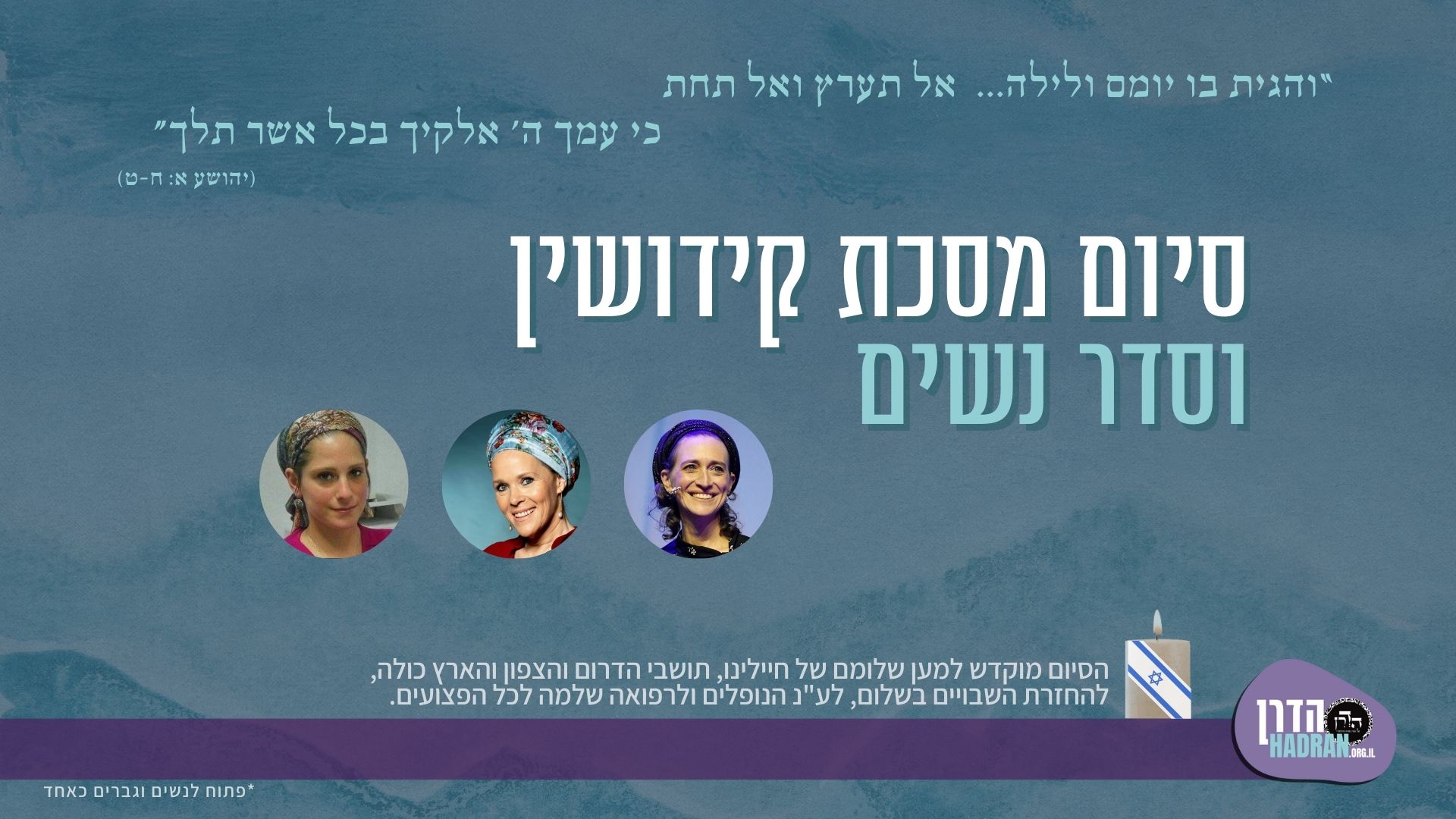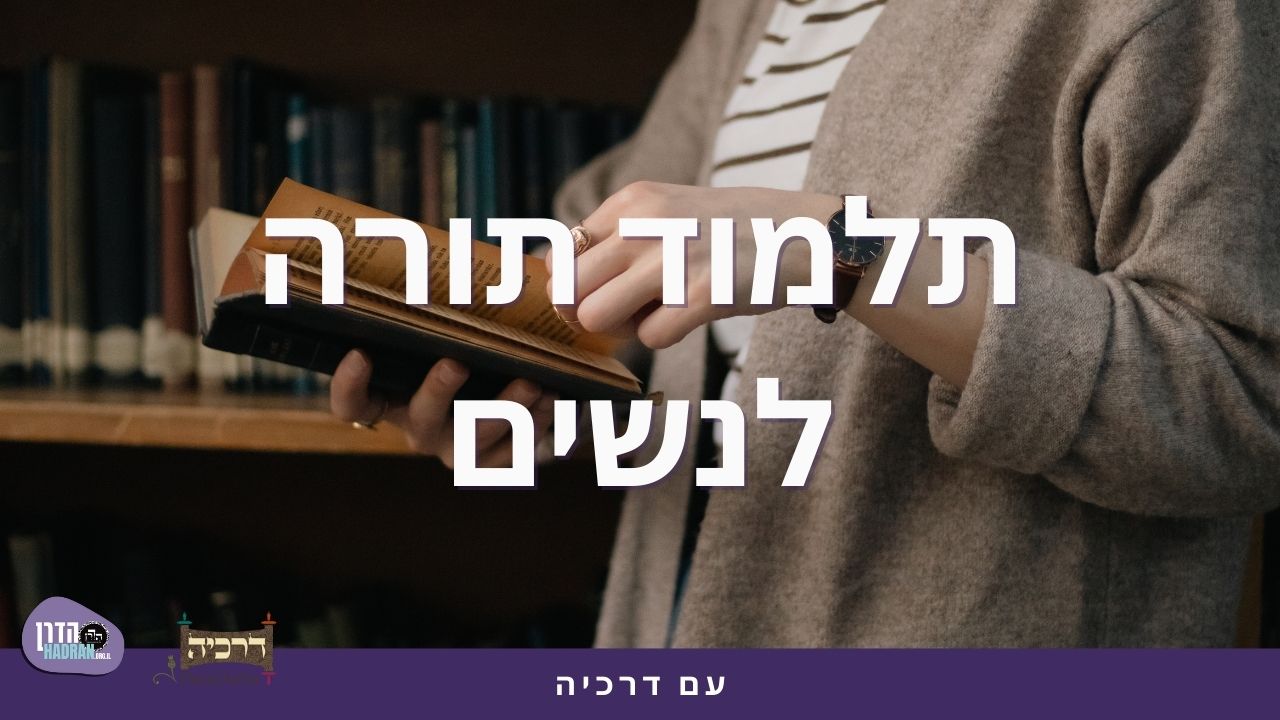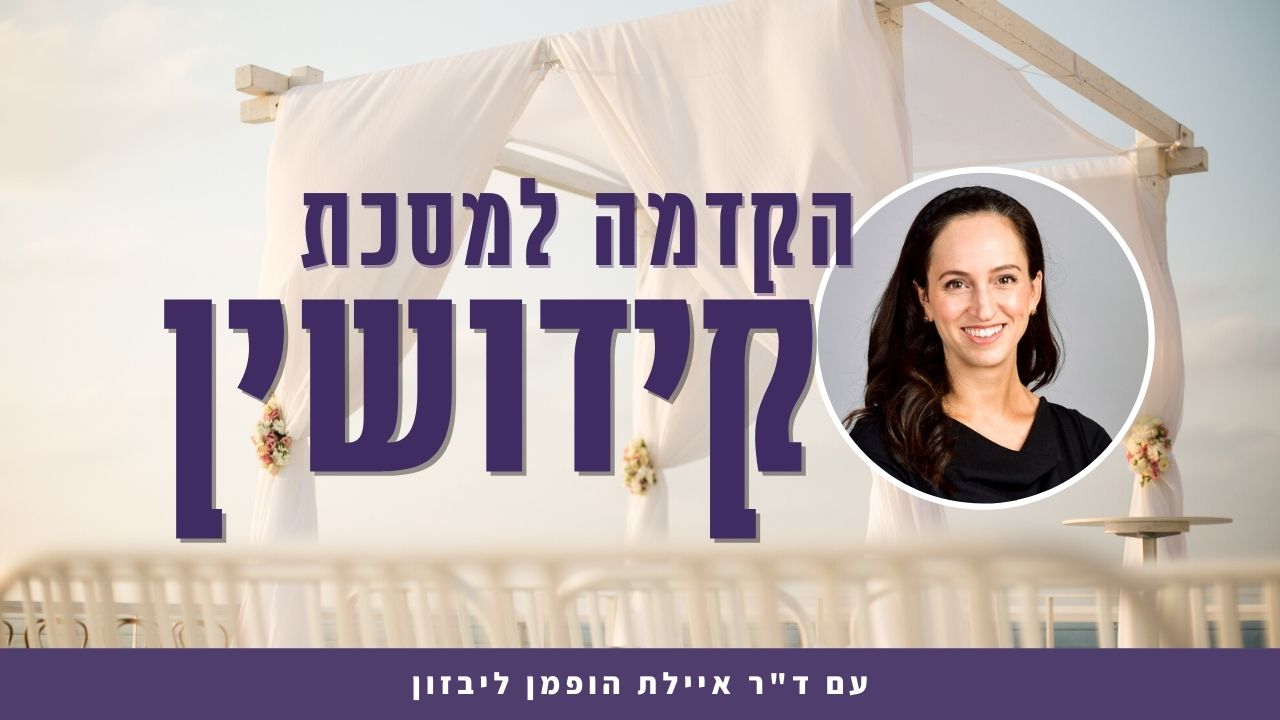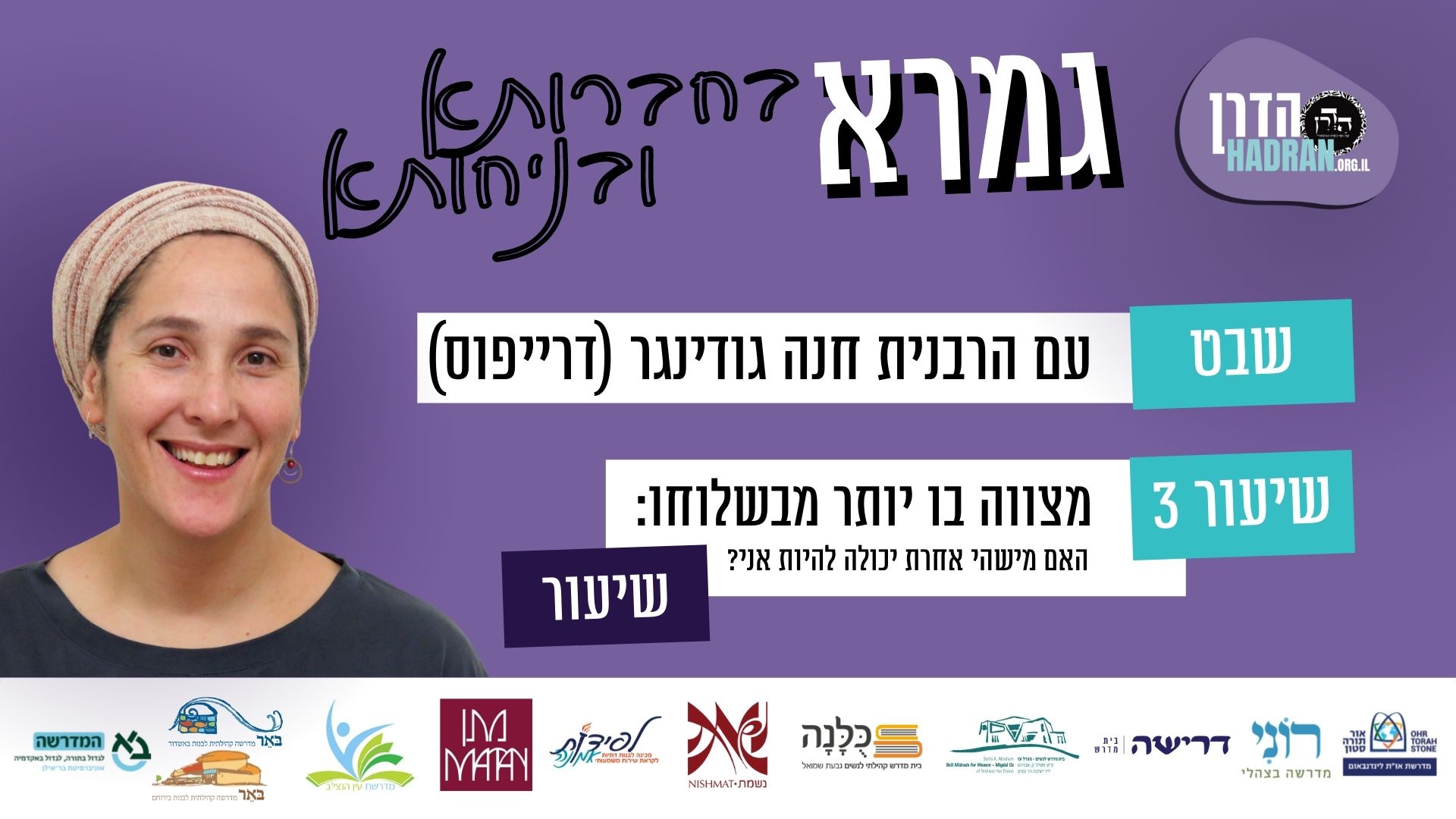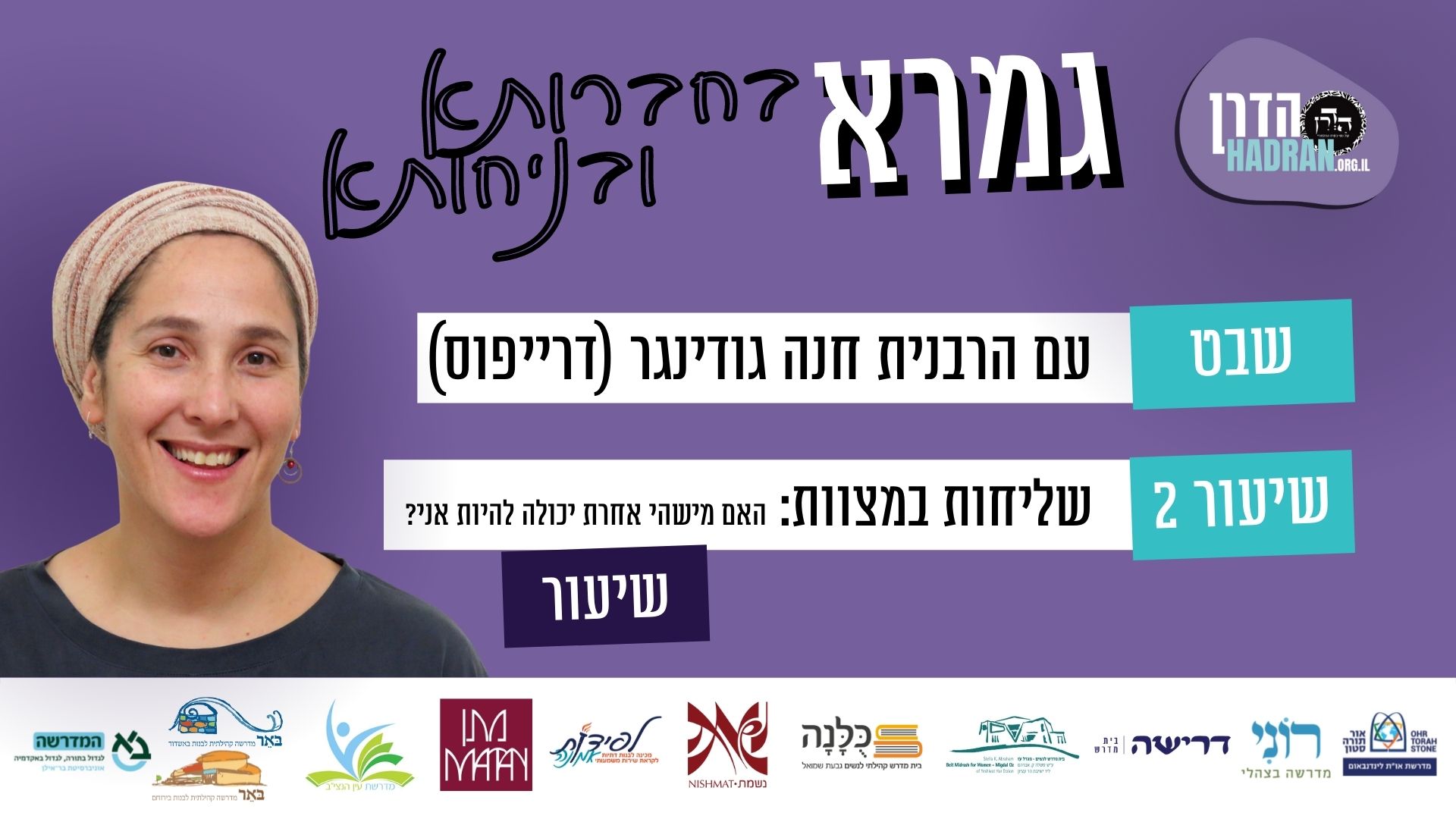הלימוד החודש מוקדש לרפואת פיליס הכט, גיטל פעשא בת מאשה רחל על ידי חברותיה הרבות שאוהבות ומעריכות אותה.
רוצה להקדיש שיעור?

תקציר
כלים
הלימוד החודש מוקדש לרפואת פיליס הכט, גיטל פעשא בת מאשה רחל על ידי חברותיה הרבות שאוהבות ומעריכות אותה.
כלים
העמקה
רוצה להבין מה באמת קורה מתחת לפני השטח של הסוגיה?
שיעורים, פודקאסטים והרחבות של מיטב המורות שלנו יפתחו לך עוד זוויות וכיווני חשיבה.
חדשה בלימוד הגמרא?
זה הדף הראשון שלך? איזו התרגשות עצומה! יש לנו בדיוק את התכנים והכלים שיעזרו לך לעשות את הצעדים הראשונים ללמידה בקצב וברמה שלך, כך תוכלי להרגיש בנוח גם בתוך הסוגיות המורכבות ומאתגרות.
פסיפס הלומדות שלנו
גלי את קהילת הלומדות שלנו, מגוון נשים, רקעים וסיפורים. כולן חלק מתנועה ומסע מרגש ועוצמתי.
קידושין י
אָמַר רַבִּי זֵירָא: מוֹדֶה רַבִּי לְעִנְיַן קְנָס דְּכוּלְּהוּ מְשַׁלְּמִי. מַאי שְׁנָא מִקְּטָלָא? שָׁאנֵי הָתָם, דְּאָמַר קְרָא: ״וּמֵת הָאִישׁ אֲשֶׁר שָׁכַב עִמָּהּ לְבַדּוֹ״.
Rabbi Zeira said: Rabbi Yehuda HaNasi concedes with regard to the fine of a rapist and a seducer that they all pay this fine, and they are not exempt merely because their acts of intercourse were with a non-virgin. The Gemara asks: In what way is this case different from the death penalty? With respect to the death penalty they are punished as though they engaged in intercourse with a betrothed non-virgin, and yet concerning the fine, they pay as though they engaged in intercourse with a virgin. The Gemara answers: It is different there, with regard to capital punishment, as the verse states: “Then the man only who lay with her shall die” (Deuteronomy 22:25), which indicates that only one man is executed for having sexual intercourse with a virgin, and no more.
וְרַבָּנַן הַאי ״לְבַדּוֹ״ מַאי עָבְדִי לֵיהּ? מִיבְּעֵי לְהוּ לְכִדְתַנְיָא, ״וּמֵתוּ גַּם שְׁנֵיהֶם״ – עַד שֶׁיִּהְיוּ שָׁוִין כְּאֶחָד, דִּבְרֵי רַבִּי אוֹשַׁעְיָא. רַבִּי יוֹנָתָן אוֹמֵר: ״וּמֵת הָאִישׁ אֲשֶׁר שָׁכַב עִמָּהּ לְבַדּוֹ״.
The Gemara asks: And the Rabbis, what do they do with this term “only”? The Gemara answers: They require it for that which is taught in a baraita. The verse states: “Then they shall both of them die” (Deuteronomy 22:22). This indicates that this is not the case unless the two of them are equal, i.e., both deserve punishment. But if one of them cannot be punished, e.g., if he is a minor, the other is not executed either. This is the statement of Rabbi Oshaya. Rabbi Yonatan says that the verse: “Then the man only who lay with her shall die,” indicates that in some cases only one of them is liable to receive the death penalty.
וְרַבִּי יוֹחָנָן, הַאי סְבָרָא מְנָא לֵיהּ? אִם כֵּן נִכְתּוֹב קְרָא ״בְּעוּלַת אִישׁ״, מַאי ״בְּעוּלַת בַּעַל״ – שְׁמַע מִינַּהּ תַּרְתֵּי.
The Gemara asks: And Rabbi Yoḥanan, from where does he derive this conclusion that only a woman’s husband can render her a non-virgin through intercourse in an atypical manner, if he uses this verse to derive the mode of betrothal by means of sexual intercourse? The Gemara answers: If so, that this verse is teaching only one halakha, let the verse write: If a man be found lying with a beulat ish, literally, a woman who engaged in sexual intercourse with a man. What is indicated by the term “beulat ba’al,” literally, who engaged in sexual intercourse with a husband? Learn two halakhot from it: First, that one can betroth a woman through intercourse, and second, that only a woman’s husband can render her a non-virgin by intercourse in an atypical manner.
אִיבַּעְיָא לְהוּ: תְּחִילַּת בִּיאָה קוֹנָה אוֹ סוֹף בִּיאָה קוֹנָה? נָפְקָא מִינַּהּ כְּגוֹן שֶׁהֶעֱרָה בָּהּ, וּפָשְׁטָה יָדָהּ וְקִבְּלָה קִדּוּשִׁין מֵאַחֵר.
§ A dilemma was raised before the Sages: Since intercourse is not a momentary act but has different stages, does the beginning of intercourse effect acquisition or does the end of intercourse effect acquisition? When exactly is the moment of betrothal? The Gemara comments: The practical difference resulting from this question is in a case where one engaged in only the initial stage of intercourse with her and in the meantime she reached her hand out and accepted betrothal from another man. If the beginning of sexual intercourse effects acquisition, the other man’s betrothal is meaningless. If the end of sexual intercourse effects acquisition, she is betrothed to the other man.
אִי נָמֵי, לְכֹהֵן גָּדוֹל דְּקָא קָנֵי בְּתוּלָה בְּבִיאָה, מַאי? אָמַר אַמֵּימָר מִשְּׁמֵיהּ דְּרָבָא: כׇּל הַבּוֹעֵל – דַּעְתּוֹ עַל גְּמַר בִּיאָה.
Alternatively, there is a difference with regard to a High Priest who acquires a virgin through sexual intercourse. If only the end of intercourse effects acquisition, she is no longer a virgin at the time of the betrothal, which would mean that a High Priest cannot acquire a woman through intercourse, as it is prohibited for him to marry a non-virgin (Leviticus 21:14). What, then, is the halakha? Ameimar said in the name of Rava: Anyone who engages in sexual intercourse has the completion of the act of intercourse in mind, not the beginning. Therefore, the acquisition is complete only when the act has been completed.
אִיבַּעְיָא לְהוּ: בִּיאָה נִשּׂוּאִין עוֹשָׂה, אוֹ אֵירוּסִין עוֹשָׂה? נָפְקָא מִינַּהּ – לְיוֹרְשָׁהּ,
Additionally, a dilemma was raised before the Sages: Does the sexual intercourse that is performed to effect betrothal effect marriage at the same time that it effects betrothal, or does it effect only betrothal? The practical difference that arises from this question concerns all cases where it matters whether a woman is betrothed or married. For example, one issue is whether the act allows him to inherit property from her. If he betroths her through intercourse, does he inherit her property when she dies as he would if they were married?
וְלִיטַמֵּא לָהּ, וּלְהָפֵר נְדָרֶיהָ. אִי אָמְרַתְּ נִשּׂוּאִין עוֹשָׂה – יוֹרְשָׁהּ וּמִיטַּמֵּא לָהּ וּמֵיפֵר נְדָרֶיהָ, וְאִי אָמְרַתְּ אֵירוּסִין עוֹשָׂה – אֵינוֹ יוֹרְשָׁהּ וְאֵינוֹ מִיטַּמֵּא לָהּ וְאֵינוֹ מֵיפֵר נְדָרֶיהָ. מַאי?
And if he is a priest, is he required to become ritually impure to bury her, as he must do for his wife? And similarly, does a betrothal through intercourse allow him to nullify her vows by himself, without her father’s participation? If you say that intercourse effects marriage, he inherits property from her, and he becomes impure to bury her, and he nullifies her vows alone. And if you say that it effects only betrothal, he does not inherit property from her, and he does not become ritually impure to bury her, and he cannot nullify her vows alone. What, then, is the halakha?
אָמַר אַבָּיֵי: תָּא שְׁמַע: הָאָב זַכַּאי בְּבִתּוֹ בְּקִדּוּשֶׁיהָ בְּכֶסֶף בִּשְׁטָר וּבְבִיאָה, וְזַכַּאי בִּמְצִיאָתָהּ וּבְמַעֲשֵׂה יָדֶיהָ, וּבַהֲפָרַת נְדָרֶיהָ, וּמְקַבֵּל אֶת גִּיטָּהּ, וְאֵינוֹ אוֹכֵל פֵּירוֹת בְּחַיֶּיהָ. נִישֵּׂאת – יָתֵר עָלָיו הַבַּעַל שֶׁאוֹכֵל פֵּירוֹת בְּחַיֶּיהָ.
Abaye said: Come and hear a resolution from the following mishna (Ketubot 46b): A father has authority over his daughter with regard to her betrothal, whether it is through money, through a document, or through sexual intercourse. Likewise, a father has a right to items she has found, and to her earnings, and to effect the nullification of her vows, i.e., a father may nullify his daughter’s vows. And he accepts her bill of divorce on her behalf if she is divorced from betrothal before she becomes a grown woman. And although he inherits her property when she dies, e.g., property she inherited from her mother’s family, he does not enjoy the profits of her property during her lifetime. If the daughter married, the husband has more rights and obligations than her father had before the marriage, as he enjoys the profits of her property during her lifetime.
קָתָנֵי ״בִּיאָה״, וְקָתָנֵי ״נִישֵּׂאת״! כִּי קָתָנֵי ״נִישֵּׂאת״ – אַשְּׁאָרָא.
The mishna teaches that a man has rights to his daughter’s betrothal through sexual intercourse, and it subsequently teaches: If the daughter married. This indicates that intercourse effects only betrothal. The Gemara rejects this claim: When it teaches: If the daughter married, that is referring to the other modes mentioned here, i.e., betrothal by means of money or a document. In these cases there is a difference between betrothal and marriage, while it is possible that betrothal through intercourse effects marriage as well.
אָמַר רָבָא: תָּא שְׁמַע: בַּת שָׁלֹשׁ שָׁנִים וְיוֹם אֶחָד מִתְקַדֶּשֶׁת בְּבִיאָה, וְאִם בָּא עָלֶיהָ יָבָם – קְנָאָהּ, וְחַיָּיבִין עָלֶיהָ מִשּׁוּם אֵשֶׁת אִישׁ, וּמְטַמְּאָה אֶת בּוֹעֲלָהּ
Rava said: Come and hear a resolution from a baraita: A girl who is three years and one day old can be betrothed through intercourse, and if her yavam engaged in intercourse with her, he has acquired her. And if she is married, one is liable if he engages in intercourse with her, due to her status as a married woman. And if she is impure as a menstruating woman, she renders one who engages in intercourse with her ritually impure for seven days.
לְטַמֵּא מִשְׁכָּב תַּחְתּוֹן כְּעֶלְיוֹן,
And he renders impure the object upon which he lies like the upper one. One who engages in sexual intercourse with a menstruating woman renders the objects upon which he lies ritually impure even if he has no direct contact with them.
וְאִם נִישֵּׂאת לְכֹהֵן – אוֹכֶלֶת בִּתְרוּמָה, וְאִם בָּא עָלֶיהָ אֶחָד מִכׇּל עֲרָיוֹת שֶׁבַּתּוֹרָה – מוּמָתִין עַל יָדָהּ, וְהִיא פְּטוּרָה. וְאִם בָּא עָלֶיהָ אֶחָד מִן הַפְּסוּלִין – פְּסָלָהּ מִן הַכְּהוּנָּה.
And if she marries a priest she may partake of teruma from that point onward. And if one of those with whom sexual relations are forbidden by the Torah (see Leviticus, chapter 18) engages in intercourse with her, he is put to death due to his sin with her, and she is exempt from punishment as a minor. And if someone of unfit lineage, i.e., a man who would disqualify her from marrying a priest if he engaged in sexual intercourse with her, engages in intercourse with her, he has disqualified her from marrying into the priesthood. This concludes the baraita.
קָתָנֵי ״בִּיאָה״, וְקָתָנֵי ״נִישֵּׂאת״! הָכִי קָאָמַר: אִי הָנֵי נִשּׂוּאִין דְּכֹהֵן נִינְהוּ – אוֹכֶלֶת בִּתְרוּמָה.
The Gemara analyzes this source. It is taught in that baraita: She can be betrothed through sexual intercourse, and it is taught separately: And if she marries a priest. This indicates that intercourse does not effect marriage. The Gemara rejects this: This is what the baraita said: If this betrothal through intercourse is a marriage to a priest, she may partake of teruma. It is possible that there are not two separate stages here but a single action, as sexual intercourse effects marriage.
תָּא שְׁמַע: וּכְבָר שָׁלַח יוֹחָנָן בֶּן בַּג בַּג אֵצֶל רַבִּי יְהוּדָה בֶּן בְּתִירָה לִנְצִיבִין: שָׁמַעְתִּי עָלֶיךָ שֶׁאַתָּה אוֹמֵר אֲרוּסָה בַּת יִשְׂרָאֵל אוֹכֶלֶת בִּתְרוּמָה. שָׁלַח לוֹ: וְאַתָּה אִי אַתָּה אוֹמֵר כֵּן? מוּחְזְקַנִי בְּךָ שֶׁאַתָּה בָּקִי בְּחַדְרֵי תוֹרָה, לִדְרוֹשׁ בְּקַל וָחוֹמֶר אִי אַתָּה יוֹדֵעַ?!
Come and hear a proof from a baraita: And Yoḥanan ben Bag Bag already sent a message to Rabbi Yehuda ben Beteira in the city of Netzivin: I heard about you that you say that the daughter of a non-priest betrothed to a priest may partake of teruma. Rabbi Yehuda ben Beteira sent back this reply to him: And do you not say so? I know about you that you are an expert in many areas of Torah; do you not know how to teach halakhot based on an a fortiori inference?
וּמָה שִׁפְחָה כְּנַעֲנִית, שֶׁאֵין בִּיאָתָהּ מַאֲכִילָתָהּ בִּתְרוּמָה – כַּסְפָּהּ מַאֲכִילָתָהּ בִּתְרוּמָה, זוֹ, שֶׁבִּיאָתָהּ מַאֲכִילָתָהּ בִּתְרוּמָה – אֵינוֹ דִּין שֶׁכַּסְפָּהּ מַאֲכִילָתָהּ בִּתְרוּמָה? אֲבָל מָה אֶעֱשֶׂה שֶׁהֲרֵי אָמְרוּ חֲכָמִים: אֵין אֲרוּסָה בַּת יִשְׂרָאֵל אוֹכֶלֶת בִּתְרוּמָה עַד שֶׁתִּכָּנֵס לַחוּפָּה.
The a fortiori inference is as follows: If in the case of a Canaanite maidservant, whose sexual intercourse with a priest does not allow her to partake of teruma, as she is not betrothed to him, her money, i.e., if a priest acquires her through money, allows her to partake of teruma, is it not logical with regard to this betrothed woman, whose sexual intercourse with a priest allows her to partake of teruma, that her betrothal money from the priest should allow her to partake of teruma? If this is indeed the case, the daughter of a non-priest betrothed to a priest should be permitted to partake of teruma. But what can I do, as the Sages said: By rabbinic law, the daughter of a non-priest betrothed to a priest may not partake of teruma until she enters the wedding canopy.
הֵיכִי דָמֵי? אִי בְּבִיאָה שֶׁעַל יְדֵי חוּפָּה, וְכֶסֶף שֶׁעַל יְדֵי חוּפָּה – בְּתַרְוַיְיהוּ מֵיכָל אָכְלָה!
The Gemara clarifies: What are the circumstances of the comparison between money and sexual intercourse? If it is referring to a case of sexual intercourse by means of a wedding canopy, i.e., after they are married, and betrothal through money where the marriage is then completed by means of a wedding canopy, in both cases she may partake of teruma even by rabbinic law, as she is a full-fledged married woman.
וְאֶלָּא, בְּבִיאָה שֶׁעַל יְדֵי חוּפָּה, וְכֶסֶף שֶׁלֹּא עַל יְדֵי חוּפָּה – הָכָא תַּרְתֵּי, וְהָכָא חֲדָא! אֶלָּא לָאו בְּבִיאָה שֶׁלֹּא עַל יְדֵי חוּפָּה, וְכֶסֶף שֶׁלֹּא עַל יְדֵי חוּפָּה.
Or rather one could say that this comparison is referring to sexual intercourse by means of a wedding canopy, and betrothal through money not by means of a wedding canopy. If so, the a fortiori inference is not valid, as here, in the case of intercourse, there are two stages of acquisition, intercourse followed by the wedding canopy, and here, in the case of money, there is only one stage. Rather, is it not correct to say that the comparison between money and intercourse is referring to sexual intercourse not by means of a wedding canopy and also money not by means of a wedding canopy?
אִי אָמְרַתְּ בִּשְׁלָמָא נִשּׂוּאִין עוֹשָׂה – מִשּׁוּם הָכִי פְּשִׁיטָא לֵיהּ דַּאֲלִימָא לַהּ בִּיאָה מִכֶּסֶף. אֶלָּא אִי אָמְרַתְּ קִדּוּשִׁין עוֹשָׂה, מַאי שְׁנָא הָכָא דִּפְשִׁיטָא לֵיהּ, וּמַאי שְׁנָא הָכָא דִּמְסַפְּקָא לֵיהּ?
Granted, if you say that intercourse by itself effects marriage, it is due to that reason that it is obvious to Rabbi Yehuda ben Beteira that the mode of sexual intercourse is stronger than money, and allows her to partake of teruma. But if you say that sexual intercourse effects only betrothal, what is different here, in the case of betrothal through intercourse, that it is obvious to him that it allows her to partake of teruma, and what is different here, in the case of betrothal through money, that he is uncertain and must derive the matter through an a fortiori inference? In both cases she is only betrothed.
אָמַר רַב נַחְמָן בַּר יִצְחָק: לְעוֹלָם אֵימָא לָךְ בְּבִיאָה שֶׁעַל יְדֵי חוּפָּה וְכֶסֶף שֶׁלֹּא עַל יְדֵי חוּפָּה. וּדְקָאָמְרַתְּ: ״הָכָא תַּרְתֵּי וְהָכָא חֲדָא״ – קַל וָחוֹמֶר מִיהָא אִיתֵיהּ;
Rav Naḥman bar Yitzḥak said: Actually, I will say to you that he is speaking about sexual intercourse by means of a wedding canopy and money not by means of a wedding canopy. And as for that which you said in opposition to this a fortiori inference: Here there are two stages of acquisition, and here there is only one stage. In any event, there is a valid a fortiori inference.
וְהָכִי שְׁלַח לֵיהּ: וּמָה שִׁפְחָה כְּנַעֲנִית, שֶׁאֵין בִּיאָתָהּ מַאֲכִילָתָהּ בִּתְרוּמָה אֲפִילּוּ עַל יְדֵי חוּפָּה – כַּסְפָּהּ מַאֲכִילָתָהּ בְּלֹא חוּפָּה, זוֹ, שֶׁבִּיאָתָהּ מַאֲכִילָתָהּ בִּתְרוּמָה עַל יְדֵי חוּפָּה – אֵינוֹ דִּין שֶׁכַּסְפָּהּ מַאֲכִילָתָהּ בִּתְרוּמָה בְּלֹא חוּפָּה?
And this is what Rabbi Yehuda ben Beteira sent him, i.e., his statement should be understood as follows: If a Canaanite maidservant, whose intercourse with a priest does not allow her to partake of teruma, even by means of a wedding canopy, and yet her money allows her to partake of teruma without the means of a wedding canopy, is it not logical with regard to this betrothed woman, whose intercourse with a priest allows her to partake of teruma by means of a wedding canopy, that her betrothal money from the priest should allow her to partake of teruma without the means of a wedding canopy?
אֲבָל מָה אֶעֱשֶׂה שֶׁהֲרֵי אָמְרוּ חֲכָמִים: אֵין אֲרוּסָה בַּת יִשְׂרָאֵל אוֹכֶלֶת בִּתְרוּמָה עַד שֶׁתִּכָּנֵס לַחוּפָּה, מִשּׁוּם דְּעוּלָּא.
But what can I do, as the Sages said: By rabbinic law, the daughter of a non-priest betrothed to a priest may not partake of teruma until she enters the wedding canopy, due to the reason stated by Ulla. According to Ulla, there is a concern that she may feed her siblings or members of her family teruma while she is still living in her father’s house.
וּבֶן בַּג בַּג? גַּבֵּי שִׁפְחָה כְּנַעֲנִית לָא שַׁיַּיר בְּקִנְיָנַהּ, הָכָא, שַׁיֵּיר בְּקִנְיָנַהּ.
And ben Bag Bag explains why one cannot accept this a fortiori inference involving a Canaanite maidservant: With regard to a Canaanite maidservant who is purchased with money, the buyer does not leave out anything from her acquisition, i.e., he completes the purchase in full. Here, in the case of betrothal, he leaves out part of her acquisition, as the stage of marriage has yet to be performed. Therefore, these two cases are dissimilar.
רָבִינָא אָמַר: מִדְּאוֹרָיְיתָא – מִיפְשָׁט פְּשִׁיטָא לֵיהּ דְּאָכְלָה, וּמִדְּרַבָּנַן הוּא דִּשְׁלַח לֵיהּ.
Ravina said that by Torah law, it is obvious to Yoḥanan ben Bag Bag that she may partake of teruma also when she is betrothed to a priest through money alone, as she is acquired with his money. And the question that he sent him is referring to the halakha by rabbinic law.
וְהָכִי שְׁלַח לֵיהּ: שָׁמַעְתִּי עָלֶיךָ שֶׁאַתָּה אוֹמֵר אֲרוּסָה בַּת יִשְׂרָאֵל אוֹכֶלֶת בִּתְרוּמָה, וְלָא חָיְישַׁתְּ לְסִימְפּוֹן. שְׁלַח לֵיהּ: וְאַתָּה אִי אַתָּה אוֹמֵר כֵּן? מוּחְזְקַנִי בְּךָ שֶׁאַתָּה בָּקִי בְּחַדְרֵי תוֹרָה, לִדְרוֹשׁ בְּקַל וָחוֹמֶר אִי אַתָּה יוֹדֵעַ?!
Ravina elaborates: And this is the question that he sent to him: I heard about you that you say that in practice the daughter of a non-priest betrothed to a priest may partake of teruma, and we are not concerned about an annulling factor [simfon], i.e., that he might find some blemish in her through which the betrothal would be considered retroactively invalid. If so, she would have eaten teruma when she was not permitted to do so. And it was with regard to this issue that Rabbi Yehuda ben Beteira sent to him: And do you not say this? I know about you that you are an expert in many areas of Torah; do you not know how to teach halakhot based on an a fortiori inference?
וּמָה שִׁפְחָה כְּנַעֲנִית שֶׁאֵין בִּיאָתָהּ מַאֲכִילָתָהּ בִּתְרוּמָה – כַּסְפָּהּ מַאֲכִילָתָהּ בִּתְרוּמָה, וְלָא חָיְישִׁינַן לְסִימְפּוֹן, זוֹ שֶׁבִּיאָתָהּ מַאֲכִילָתָהּ בִּתְרוּמָה – אֵינוֹ דִּין שֶׁכַּסְפָּהּ מַאֲכִילָתָהּ בִּתְרוּמָה, וְלֹא נֵיחוּשׁ לְסִימְפּוֹן? אֲבָל מָה אֶעֱשֶׂה שֶׁהֲרֵי אָמְרוּ חֲכָמִים: אֲרוּסָה בַּת יִשְׂרָאֵל אֵינָהּ אוֹכֶלֶת בִּתְרוּמָה
The a fortiori inference is as follows: If a Canaanite maidservant, whose engaging in intercourse with a priest does not allow her to partake of teruma, and yet her receiving purchase money allows her to partake of teruma, and we are not concerned about simfon, i.e., that the Canaanite maidservant may have some physical blemish that nullifies her purchase retroactively, is it not logical with regard to this betrothed woman, whose intercourse with a priest allows her to partake of teruma, that her receiving betrothal money from the priest should allow her to partake of teruma even before entering the wedding canopy, and we should not be concerned about simfon? But what can I do, as the Sages said: By rabbinic law the daughter of a non-priest betrothed to a priest may not partake of teruma
